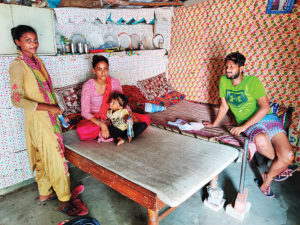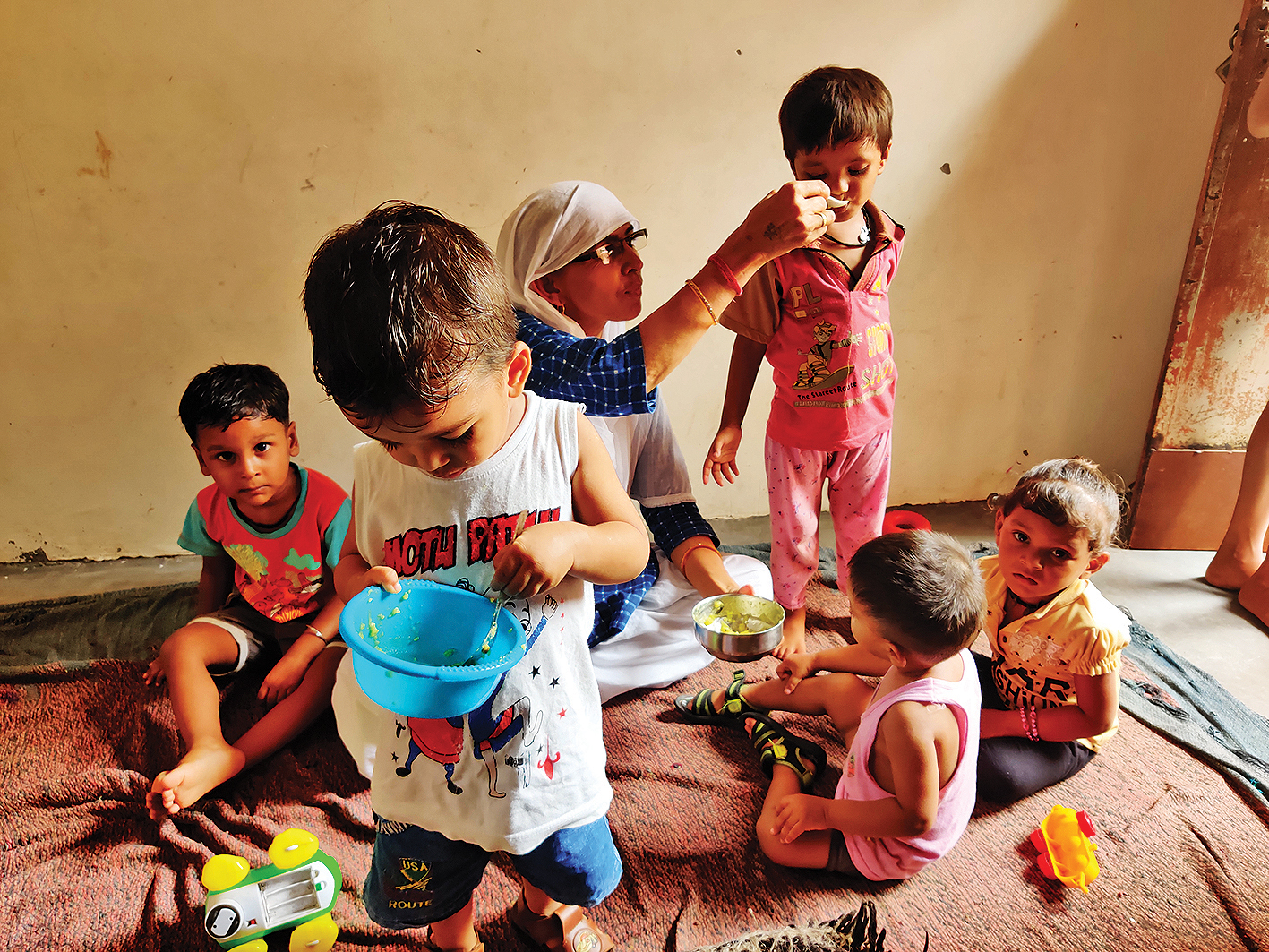ANGANWADI WORKERS ARE NOT PAID ENOUGH FOR THE WORK THEY PUT IN. THE FAMILIES THEY HELP NEED THEM EVERYDAY
Anganwadis (government-run day-care centres) have become a safe haven for children as their parents toil on low incomes, especially since they free up mothers to work as part-time domestic help in nearby houses. But the anganwadi workers who devote their time to looking after the children who come to these centres are themselves grossly underpaid.
In a narrow lane in Palam’s Harijan lane of the Capital city, is one such room which acts as a creche and classroom for children of ages up to 6. It is a simple space with colourful walls, thanks to the workers’ making and pasting cardboard cut outs of animals and people.
With just two chairs, the dhurrie in the entire expanse acts as a learning and playing area for the kids who have a couple of toys to play with. Most of the kids’ fathers are rickshaw pullers and daily wage labourers, some of whom will remain in the locality only for a few months, as long as they get work on construction sites. Others have stayed there for generations.
This is where we meet Krishna, a helper. Each anganwadi is supposed to take care of 20-25 children and has a total staff of two: one worker (who has studied up to 12th standard from any recognised board) and a helper (one who has passed class 8 from a recognised institution) to be appointed. There are a total of 22,000 such workers and helpers in Delhi.
Because anganwadi workers and helpers are recruited on temporary basis at Block level, the government gets away with paying about Rs 10,000 per month to the workers and helpers about Rs 4,800.
Krishna started working here, she says, 32 years back at the age of 20. Now in her 50s, having devoted all this time to looking after “others’ children” whom she says, she loves like her own, the government “should at least think about our welfare”.
We meet her as she looks after about 10 children by herself. Explaining why there aren’t more kids being fed and tended to, she says, “It’s too hot in here.” “I dropped them off, or parents came early to get them”, she says in between ladling out spoonfuls of khichdi to the children one by one.

The anganwadi has been a lifeline for her. “My husband was a drug addict so he couldn’t take care of us and I was put through so much physical abuse. At the time I started this job I had two very small daughters — even for that I would be taunted by my husband. It’s strange, because he had eight sisters himself. After I started working here, I had one son and then three years later another. Even after the first son, my mother-in-law would ask me to have more”, she says.
This is why Krishna worked hard to bring up her children right, and loves to see the ones she took care of once have their own children, whom she looks after now. “I am uneducated but I try as much as I can to do whatever I can to be of help to these children and mothers.”
She says rather sombrely that she has spent her entire life working the anganwadi centres but will not reap any reward when her time comes to retire. She believes the government must do something for people like her. “There should be some support.”
As we talk, women come and pick up their children and also take containers of food home for their toddlers.
Krishna gives her own example to exemplify how important a role the anganwadi played in her life. “My husband was a good man for only the first two years of our marriage”. After that the drugs and the abuse began. “I started stitching saree falls for ladies, and small little tailoring jobs. At least I would earn Rs 30-40 everyday”, Krishna says, but her husband would sell everything they had at home to soothe his addiction. “He even told his friends to take me for a night, in return for alcohol.” That is when she decided to stop giving him any money.
Then she started working at the anganwadi, where she was paid Rs 100 per month. Now, she is still paid meagrely, at Rs 4,800 per month. But just as the anganwadi has been a refuge for the thousands of children, it sustained her family back home as she too took some food for her children. “I told the ma’am I worked with that we didn’t have food at home. So, I could took biscuits and slices of bread which I would give to my children. Sometimes five days would go by without dal-roti, but we survived because of this help”, she says.
Some of the work was physically taxing, as they were supposed to pick up food supplies themselves. “Now things are better, with food being delivered to our doorstep from distribution centres. Before, I would carry it on my head for a few kilometres”, she says.
Presently, 15-20 kids come to the centre which covers the basti, including many children under the age of five who are beneficiaries of the free food scheme, and medical facilities available for them and pregnant women and new mothers. But the pay is a pittance as she works six days a week from 9 am to 2 pm.
Where they come from
One of the women who comes to pick up her child — one of six lakh children enrolled in anganwadis in Delhi — is Jyoti. We accompany them to their home, a tent-like structure by the pavement of Palam Extension road.
Her tall height, her younger sister says, was one of the reasons Jyoti’s teacher wanted her to join the security forces. But that did not materialise, “because in our caste women don’t go out to work”, Jyoti finishes for her sister.
“I wanted to do something… if such thinking was not present, I would have become so big. I dreamed a lot,” she keeps repeating.
Now her dreams are focused on her children achieving something. “It’s just been a month, but I know they (at the anganwadi) talk to my children with love and take care of them.”
At another anganwadi in Sangam Vihar, we meet Neha, who faces a piquant situation — there is no senior level ‘worker’, so she manages the centre by herself. “I don’t get paid for the role of a ‘worker’ but all those responsibilities are on me”, she says. She is a graduate, presently studying for a Master’s in social work. “The government doesn’t look at this. That there are educated people working who should get at least the role of a worker.” Instead she points out, she can recall at least four centres in the area which do not have workers.
We also meet Renu Sharma, also a helper. Most children who come to this centre in Gali No. 10, Sharma says, desperately need the free food that is provided. Like Lalita, who comes to pick up her child — her two other kids are overage for the creche but do not attend school. Her husband Pappu works as a carpenter and earns about Rs 11,000 a month.
The other benefitiaries include those living in an open ground close to the centre, where at least 10 families have erected tents for years. Each family with a working member collects recyclable material like plastic bottles — for this they can earn about Rs 20 per kg, which usually means Rs 300 a day.
“No one has done anything for us”, the men and women say, while acknowledging that at least their children benefit from the anganwadi system. “These centres feed our children and help them stay healthy, so we are happy. They could, however, introduce different food every now and then, for the kids get sick of eating the same thing every day”.
One says promises keep being made but do not materialise. “We vote because we are scared and swayed by promises,” they discuss, even as small children sit on the muddy ground munching the chana which is on the anganwadi’s menu for the day
Despite grumbles about the menu, appreciation of the service rendered by the anganwadi is immense amongst the crowd. And for people like Krishna and Renu, this is a job which gives them satisfaction, even though the pay is meagre.





